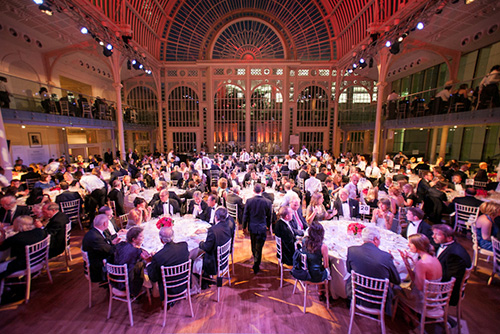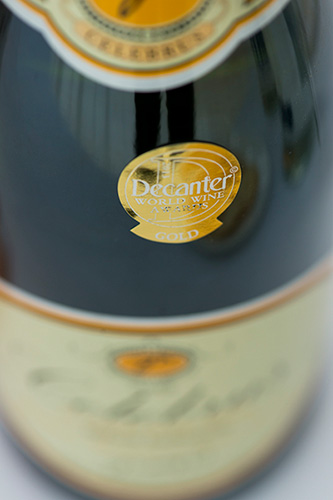Do Wine Medals Really Matter?
Angela Mount - 05/09/2013
Last night, at a glittering awards ceremony at London’s Royal Opera House, the Decanter World Wine Awards celebrated its 10th anniversary and announced its top awards; having revealed the medal winners from this year’s competition back in May, the evening revealed the top international trophies, celebrating the very top wines of the competition, together with the awards for the best retailers and wine buying teams in the UK.

The results of the international trophies, recognising the absolute best of all the wines entered from across the world, prove how much the wine market has changed in the last 10 years, and how the New World continues to strive forward and impress in terms of sheer quality, and whilst giving European wine producing countries a shake up... Both Riesling trophies won by New Zealand and Australia; the Pinot Noir trophies, 2 of the most coveted, won, not by top class Burgundies, but by a Canadian and a German wine – unheard of! Rhone blends dominated by Australia and South Africa, whilst Sauvignon blanc international awards , somewhat less surprisingly went to New Zealand and South Africa – but not a single European wine amongst them, which bears testament to the changes that continue to take place.
Wine producers and wine retailers alike hold great stock by these awards; they are held in great esteem by the wine world, and are judged by a carefully chosen panel of 225 judges from around the world, including 75 Masters of Wine.
But do they really matter to wine drinkers and enthusiasts?
My view is an uniquivocal YES; as an ex supermarket buyer I know how confusing wine ranges can be for people who love a glass of wine, but don’t know what to choose. Faced with supermarket aisles stacked with hundreds of different wines, and wine shops featuring numerous wines, all hand-picked and ‘carefully crafted’, wouldn’t you be confused?
The Decanter World Wine Awards are celebrated the world over, but have their home in the UK, with judging taking place every April. Launched in 2004, with 4000 wines in the competition, this year’s entrants totalled over 14,000, proving how valuable these awards are to the wine producers who enter their wines…. Partly for a pat on the back, if they win, or to see how they wines perform, against the competition, but largely, because they realise that medals sell wines.
When faced with a veritable sea of wines, many with undiscernable labels, what is more reassuring that a little logo or sticker on the front label, stating that it’s been given a medal in one of the world’s most prestigious wine competitions? Medals provide reassurance, provide the trust that it is safe to move into unchartered territory and try a new wine. Tried and tested by experts, it makes the choice easier, lessens the risks, and encourages consumers to broaden their repertoire. We see medals and awards emblazoned on packaging, or in magazines, across all types of consumer goods – from ‘ best cheese in the west country’, to ‘best baby car seat’; from ‘winner of the Xmas pudding award’ to ‘ best coffee machine’; and most of the time we listen – we trust expert judges in whatever category, and this gives us confidence to make informed decisions about what we buy. In the confusing and often mystifying world of wine, this is even more the case.
So how are wines judged in the Decanter World Wine Awards, and how are the results determined? This year, over 14,000 wines were entered from across the world, including one from Belgium, 49 from China and 4 from Egypt. Of these 70% won a medal, deemed worthy of recognition by the judges; however only 2% achieved a coveted gold medal, with judges pushing for absolute excellence in wines, in order to be rewarded at this level.

The judging takes place over 4 days in a quiet area of Parsons Green, where a total of 225 judges swirl, sniff, taste and spit their way through each day. The logistics of running a competition at this scale are challenging, yet the days run smoothly, testament to the extraordinary organisational skills of the Decanter team, who run the event with military precision. I’ve been judging for a number of years, and the process is smooth, unhurried, and efficient, with judges focussed, and supported by a friendly and professional team who ensure the right wines are on the right tables, at the right time, and are there to clear bottles, set up the next flights and replace faulty bottles as necessary, as well as recording the all important results.
There are just a few wine competitions, which have international renown, and each has different processes and systems for judging. At Decanter, ‘Regional Chairs’ are appointed – wine professionals, who are experts in a particular country or region. They will lead their respective panel over the 4 days, through hundreds of wine, providing the ultimate expertise in the decision – making process. Wines entered are divided into countries, then into manageable ‘flights’ – for example ‘ Chilean Chardonnay under £15’. All wines are served blind, the only information that judges have is the origin, and an idea of the price point, which is relevant to the judging process in order to establish the true level of value – what might be worthy of a gold medal at £8, might not deserve such outstanding praise at £45 per bottle. The panel taste, write notes, award marks, then debate and agree a result, either rejecting the wine, or giving it a gold, silver or bronze, depending on merit. Regional trophies ( the best from each country, or region), and the much – coveted international trophies are then re tasted and determined by the panel chairs, to recognise the very pinnacle of quality and achievement.
It sounds fun, and it is, but whilst friends think I’m taking a week off to sip and spit my way through hundreds of wines, it’s hard and very tiring work – analysing, tasting, comparing, assessing the calibre of each – is it balanced, will it last, is it true to type, how does it compare to the previous one, and so on…
It’s a sound and reliable process, with a carefully vetted and selected group of wine judges. Wine tasting will always be subjective, to some degree – even wine professionals have widely differing personal preferences; but what is important is that the medals that are finally decided are agreed on, not by one person, but by accredited wine professionals, who have reached a consensus.
Results are often surprising; whilst some producers seem to win year after year – Charles Heidsieck Champagne Blancs des Millenaires, and McGuigan Australian wines seem to be on the roster each year, because everything is tasted blind, there are always some real surprises, which delight the judges and provide encouragement to up and coming regions and countries – a Croatian wine winning the sweet wine over £15 category, a German Pinot Noir, the over £15 Pinot Noir category, and Valdivieso Blanc de Blancs, a Chilean sparkling wine, winning the best sparkling wine under £15 category.
This is what makes the awards exciting, to producers, judges, and ultimately, the wine-loving public. So watch out for those medals, trust the judging process and take the risk of trying something different, safe in the knowledge that the wine has been tried, tasted, debated and retasted before earning the right to that prized award.